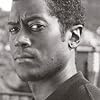To answer questions about
The Underground Railroad,
please sign up.
Cara
This is a work of fiction, not historical fiction. North and South Carolina didn't have the political structure described in the book. Whitehead is using the story of Cora's escape to get at the multitude of ways that blacks, in particular, have been dehumanized and mistreated by whites throughout the history of this country. A literal railroad is a literal representation of the darkness of the American journey for blacks and other people of color who were dispossessed and abused. One of the white characters (Lumbley?) speaks of how you can really only see American by train, but, as a white person, he has the freedom to travel without fear, with the opportunity to look out at the passing scenery and see America in all its glory and potential. As an enslaved woman who, even after escaping from her owner, is never really free, Cora can't see all of that. It is only at the end, as she finally has a chance to truly be free (or as free as a black woman could be) that she can travel above ground.
Another reviewer also pointed out that the mystery of who built the literal railroad, without the knowledge and under the feet of the white majority keeping slaves in bondage, is a powerful metaphor of how much slaves did for America, and how much of it is hidden.
When I started the novel, I didn't understand why the railroad was literal, but I get it now (or, it's more accurate to say, I get at least a portion of what Whitehead intended).
Another reviewer also pointed out that the mystery of who built the literal railroad, without the knowledge and under the feet of the white majority keeping slaves in bondage, is a powerful metaphor of how much slaves did for America, and how much of it is hidden.
When I started the novel, I didn't understand why the railroad was literal, but I get it now (or, it's more accurate to say, I get at least a portion of what Whitehead intended).
Jennifer
I was really disappointed in this aspect of the book; in fact, it pretty much ruined the book for me. I do not think that it added anything to the story to write about the railroad as if it was a physical entity and in fact, I think it took away from the novel. When I have read about the history of the underground railroad, the risks and realities of transporting a slave to freedom were enormous, and much of that was lost once the characters arrived at a "station" and could board a train. Why not do full justice to the perils that both slaves and abolitionists faced? And why not stick to the history, if the author wanted to write a historical novel? It was such a preposterous idea that it left me feeling like the author had not done his research.
Kevin Rees
At first I wasn't sure about the physical railroad, but after reading through each 'stop' (state), I found myself loving the book more and more as an allegorical journey - or better yet, a Homerian journey - where each state/stop on the railroad takes Cora to a place where racism and treatment of slaves/African-Americans is different. It isn't hard to see that the South Carolina stop is based on events from the late 19th and 20th century (medical experiments on African-Americans with syphilis, and forced sterilization). I don't think it takes away from the brutality of how slaves were treated, and it links to other historical ways that African-Americans have faced 'perils' (Jennifer's word) in post-Civil War America. It actually felt to me that Whitehead did a lot of research into other events to craft each of his states.
Mary Stapp
It seems that some readers are looking at this as a "metaphor" for Harriet Tubman's "Underground Railroad," which isn't actually much of a metaphor. It's just too obvious. But what if it's a metaphor for the idea of living underground, always in darkness, never certain of one's direction, speed, destination? Whitehead talks about the idea that fugitives were always in a state of escaping from something and unknowing of their destination. That is one possible answer to Barbara's question.
Marcia Anglarill
From an NPR' interview with the author: WHITEHEAD: Actually, I was pretty reluctant to immerse myself into that history. It took 16 years for me to finish the book. I first had the idea in the year 2000, and I was finishing up a long book called "John Henry Days," which had a lot of research. And I was just sort of, you know, getting up from a nap or something (laughter) and thought, you know, what if the Underground Railroad was an actual railroad? You know, I think when you're a kid and you first hear about it in school or whatever, you imagine a literal subway beneath the earth. And then you find out that it's not a literal subway, and you get a bit upset. And so the book took off from that childhood notion. And that's a premise, not that much of a story. So I kept thinking about it. And I thought, well, what if every state our hero went through - as he or she ran North - was a different state of American possibility? So Georgia has one sort of take on America and North Carolina - sort of like "Gulliver's Travels." The book is rebooting every time the person goes to a different state.
As others have commented, it's a metaphor, it's magical realism, it's fiction. For me it worked. In fact, in some ways, it made it easier to handle the sheer brutality of the actual reality. But without taking away from the history and the ugly truths there. I understand how some readers would take issue with it. But really, it's no different from going to the movies, even ones based on a true story with questionable interpretations. If you can't practice suspension of disbelief, you're just not going to enjoy it.
As others have commented, it's a metaphor, it's magical realism, it's fiction. For me it worked. In fact, in some ways, it made it easier to handle the sheer brutality of the actual reality. But without taking away from the history and the ugly truths there. I understand how some readers would take issue with it. But really, it's no different from going to the movies, even ones based on a true story with questionable interpretations. If you can't practice suspension of disbelief, you're just not going to enjoy it.
Joey
It drives me nuts when readers expect literal truths in fiction. Here's a brief interview that I like to share with my ENG 102 students. In it, Salman Rushdie talks about the power of magic realism to tell stories that get at human truths. I think it applies to this book. https://www.youtube.com/watch?v=EZtdh...
Linda
I just got to this part and its causing me to ponder if this is worth reading.
Update in 2017: I did not continue with this book as I like my historical fiction to be historically accurate and researched accordingly. I find it embarrassing this book got such high reviews when it is basically a fantasy. And it makes me sad to think some readers will now be confused about the correct history.
Update in 2017: I did not continue with this book as I like my historical fiction to be historically accurate and researched accordingly. I find it embarrassing this book got such high reviews when it is basically a fantasy. And it makes me sad to think some readers will now be confused about the correct history.
Carol Sama
I think it is more than unnecessary. It is inaccurate. It can confuse or mislead readers and reading should enlighten readers, particularly a historical novel with this title.
Paul Gormley
I enjoyed that aspect of it and didn't think it affected the historical truths within the novel. The (real) railroad is an integral part of the expansion of settlers across the US and trains are often seen as a metaphor for personal freedom. The train also signalled (geddit?) the transition between different stages in Cora's journey. I also liked the way each station (in different states) had its own personality.
Melody
I just finished the book yesterday and have been thinking and mulling it over. My thoughts are still very fresh and still forming so bear with me--
In terms of the magical and "unrealistic" aspects of the novel I felt the author was really pushing and playing with the genre of historic fiction, inviting us into difficult reflections that have as much to do with the present as the past. Where do YOU fall in this story? If you are white, would you have risked your life to fight slavery? Would you have been a Sam or a Martin or a Lumbly? And then if you ask yourself that question you have to ask yourself: and what am I today? Ultimately, it seemed to me that the question of the railroad and the escape to freedom was asking if our country will ever be free from the legacy of slavery and the racism that made it possible in the first place. Cora runs and runs, encountering simply new forms of bondage. The physicality of the railroad and other lyrical/magical aspects of the narrative push us out of a passive consumption of the novel as something that happened "in the past" that can be left there. The railroad in this narrative is itself alive-- shifting shapes and forms-- it is a penetration into a heart of darkness that questions the soul of this country.
In terms of the magical and "unrealistic" aspects of the novel I felt the author was really pushing and playing with the genre of historic fiction, inviting us into difficult reflections that have as much to do with the present as the past. Where do YOU fall in this story? If you are white, would you have risked your life to fight slavery? Would you have been a Sam or a Martin or a Lumbly? And then if you ask yourself that question you have to ask yourself: and what am I today? Ultimately, it seemed to me that the question of the railroad and the escape to freedom was asking if our country will ever be free from the legacy of slavery and the racism that made it possible in the first place. Cora runs and runs, encountering simply new forms of bondage. The physicality of the railroad and other lyrical/magical aspects of the narrative push us out of a passive consumption of the novel as something that happened "in the past" that can be left there. The railroad in this narrative is itself alive-- shifting shapes and forms-- it is a penetration into a heart of darkness that questions the soul of this country.
Susan
Yes, it's obviously beyond the scope of possibility...I think he's using it as a metaphor. I noted in my review that--when I was a child--I believed that the underground railroad was a real train built underground. I suspect that he played with this notion and considered what the impact might have been had this, in fact, existed. I believe that this the point of fiction--to make you consider what is and what might have been. (That's just my two cent's worth.) I was intrigued by the idea.
Catherine Hurst
I am amazed that there are so many people who thought the actual railroad was unnecessary/not possible/not historical, but weren't in the slightest bit bothered by the fact that the life in South Carolina, North Carolina, Tennessee, etc. was also not historically accurate--neither to time nor place. (E.g. much of the life in South Carolina was more accurate to the late 19th century.) I thought it all worked beautifully, telling the story of the entire history of the African diaspora, and representing the actual experience of being a slave better than almost anything else I've ever read.
Christine
I actually loved it. I think when, as children, we first hear the phrase "underground railroad" the literal image of a train running through underground tunnels (for me, it was the NYC subway) is what we think of. I still retain that visual to this day even though I know it's not accurate. I think it worked well as a plot device.
Jim
The actual, operating underground railroad hurt this book for me. I nearly stopped reading when I saw that nonsense.
The literal railroad does not seem to serve any story-telling purpose. Perhaps it is a metaphor for something, but I'm hard pressed to imagine what for.
If the literal railroad was conceived as an alternate history or fantasy exercise, the author went nowhere with it. We are given no insight into how things might have been different if the railroad had been real.
Alternate histories should have an internal logic. The alternate world should make sense. The railroad, as described, made no sense at all. Cora asks "Who built this?" The answer is mysterious: "Who builds everything?" The possible answers, including slaves, freedmen, abolitionists, God, or engineers from Wakanda are equally stupid.
Readers have every right to expect a book of this title to contain reasonably accurate historical fiction. Fantasies and alternative histories should be clearly labeled as such.
The literal railroad does not seem to serve any story-telling purpose. Perhaps it is a metaphor for something, but I'm hard pressed to imagine what for.
If the literal railroad was conceived as an alternate history or fantasy exercise, the author went nowhere with it. We are given no insight into how things might have been different if the railroad had been real.
Alternate histories should have an internal logic. The alternate world should make sense. The railroad, as described, made no sense at all. Cora asks "Who built this?" The answer is mysterious: "Who builds everything?" The possible answers, including slaves, freedmen, abolitionists, God, or engineers from Wakanda are equally stupid.
Readers have every right to expect a book of this title to contain reasonably accurate historical fiction. Fantasies and alternative histories should be clearly labeled as such.
MollyRN
So far (pg 165) I do not like it and agree that it wasn't necessary. In fact, once it was apparent that the author was going down this line (no pun intended) it immediately felt 'silly' to me. I'll be seeing the author in a theater venue locally in November to discuss this book. I'll be really interested in why he chose to do this. While I am his writing and the story I struggle with this huge element.
Simon E
I find it interesting that all the reviewers 'got it 'that this feature of the book is an allegory, but then have diverse views over whether that would confuse other readers!
For me the device of a physical Underground Railroad works on a few levels, not least is the effort that goes into creating an infrastructure that might be strong, reliable and permanent, but at the same time requires maintenance and commitment from its operators.
I did not find this was a story needing absolute historical accuracy, it is about characters, cultures and injustice. If the author feels the need to use devices to amplify the themes, does it matter? It is fiction after all.
For me the device of a physical Underground Railroad works on a few levels, not least is the effort that goes into creating an infrastructure that might be strong, reliable and permanent, but at the same time requires maintenance and commitment from its operators.
I did not find this was a story needing absolute historical accuracy, it is about characters, cultures and injustice. If the author feels the need to use devices to amplify the themes, does it matter? It is fiction after all.
Lorri
I loved it. It gave a sense of magical realism to the story. There were many other "impossible" things in the book as well. South Carolina was never a haven for "uplifting" black people. North Carolina was never a separate all-white state. It isn't meant to be accurate, it is meant to provide an alternate reality within a reality that existed to make a point about an American history that is shared. We are all a part of the "Underground Railroad"--it is a thread, it is a vein, it is a lifeline. An umbilical cord. The line about "look out the windows and you will see the true face of America." It is darkness, it is unknown, it is possibility and hope. It is danger. It also was a nod (imo) to the folk songs likening a train to America. The real history of the rails in America is fraught with the blood and exploitation of people of color.
Chris Curran
With a book called the "underground railroad " it is irresponsible to have an actual train. This might be the only book a high school or college kid reads about this important subject. They will come away with the wrong idea about the brave work done by those helping save lives. The whole story loses credibility with the train.
Jason Luz
If your lineage is a tree and that tree has been uprooted and flung by cruel masters, then your freedom, countering this dehumanizing force, must also be an act of momentum. This is not a metaphor. This is physics.
Nicole Conlan
This is... the most infuriating conversation I've ever read on Goodreads?
Benno Hansen
Of course it's "beyond the scope of possibility"!? So what? I think it adds an afterthought of horror - because the real world Cora's didn't have any actual railroads to flee by. Just impenetrable distances of hostility.
Marta Carrasco
Magical Realism?
Lisa
In response to "It's a metaphor": It doesn't work as a metaphor. "Underground railroad" is already a metaphor for the network of routes and stops for escaping slaves. It's a metaphor because it was not literally a railroad and it was not literally underground. So turning that metaphor into a literal railroad, literally underground, makes it NOT a metaphor.
Paula Thoele
It is not historical fiction. Rather it is alternate reality based on the many ways history shows humans abuse one another. It can be hard to suspend disbelief to accept the metaphor of the railroad. It can be equally difficult to understand the alternate realities of the states Cora travels through. These governments did not exist as described but easily could have. Even with a fairly good grasp of history I find myself wondering things like "did NC really try to exterminate black people?" (no - but genocide has happened too many times) It is well written and worth the time- it makes you think and wonder and research and discuss. Once a person accepts it is not Roots it all starts to make sense.
Yoana
I loved it. I think it was a crucial symbol - when Lumbly tells Cora to look out during her journey to see the real face of America, and all that you can see underground is darkness, that is a potent metaphor American's dark heart - slavery, Manifest Destiny, treatment of Native Americans; and at the same time it holds the possibility to carve a new place into it, to dig through until you reach the light. Because the characters can't really find the light in the America they inhabit - they realise they will have to dig the tunnel to it themselves.
Betsy
I too was puzzled about the "real" railroad which made keep questioning other details in the book. How many other events were totally made up? I kept looking for notes or acknowledgement of his sources for his novel.
Tami
I disliked that part. It drove me crazy trying to picture an actual underground railroad which is not what happened at all, so with that being said, the rest of the story didn't hold much weight. Very disappointing. I really enjoy historical fiction but this time, the pieces didn't add up.
Nicola Hawkes
Yes I thought this was a great idea actually, and I would have liked more of it, not less. I never expected this book to be a dry academic historically factual tome - its fiction, he can do what he likes, surely. I certainly think he did a powerful job of depicting the horrors of slave life and the dangers that sympathisers faced in helping runaways. The realised metaphor of the railroad can hardly even be called "magical". Just an alternative universe.
Harris
I also did not like the literal undergrond train thing. A historical novel should stick to actual history. That was taking too much licence in my view. Now thousands of readers will believe there really were underground trains. The real underground network was far more interesting.
Creativemf
This answer contains spoilers…
(view spoiler)
Regina Beard
I thought the notion of an actual railroad was fantastical and a terrific idea that the author could have developed even more, although, sadly, it (the railroad, that is) seemed to be more fleshed out than the main characters. This allegorical(?) element doesn't, in my mind, trivialize or minimize the horrors of slavery at all. As I read the book, I thought that there were too many ideas for the author to fully explore, but he tried to touch on each of them and came up a little short.
Cheryl Farolino
No, I didn't like that, actually. I was disappointed by the creation of a physical railroad because I think it took some power away from what is a powerful novel. I enjoyed the book immensely because the characters and their stories were so compelling. The author is a talented storyteller who spent years researching slavery and all that it entailed within the historical context of the times. I found the characters and their circumstances believable. By the portrayal of a literal railroad, I think that for some readers the entire book is reduced to nothing more than a work of fiction and therefore, the emotional punch of the book is softened. I think the book would make a great movie and if it were, I would hope that the underground railroad would be shown the way it actually operated. It would be a great story and a vehicle for educating people as well.
tl
Beyond the scope of possibility, yes, but I loved it. It is a structure that Whitehead uses over and over. I mean people don't actual intuit elevator maintenance either but that is The Intuitionist. Using mechanical objects as metaphors of our society is so interesting - we make the machines and in some way they make us.
Beth Dawson
Yes, I believe it is inappropriate in a book that claims to be historical fiction. It should be labeled strictly as fiction. I decided to read William Still's account, first published in the 19th century, based on interviews of actual people.
Yuko Shimizu
I was really confused at first, and also felt it was unnecessary. But as I read along, I was sold to the plot. The book talks about that the stations that got discovered, their tunnels were filled so the railroad wouldn't get discovered. There were so many lives lost, so many ways slaves escaped, so many unknown heroes who ran 'underground railroad', and much are without any records. the book convinces you to the readers that it is entirely possible that some of them could have been actual railroad.
Kendall
It seemed unnecessary to me and made it difficult to like this book. I love magical realism, however it doesn't work to throw one element of it into a book of historical fiction.
Jennifer Baldy
I didn't like it at first, but as it went along the metaphor of looking out the window to see nothing but darkness as the "true face of America", and at the end when she feels the tunnel and interprets it, I ended up liking it. It was good way to zoom to the next location in the story, where it would be difficult follow or leave out a journey on foot.
Andrea Weeks
The author intended for the book to have a magical realism -- even each stop on the train -- each state -- isn't historically rooted in pre-Civil War events. He meant to take many different facets of racism in American history and make them out to be stops on a literal underground train.
If you find the Fresh Air interview, the book is meant to be a parallel to Gulliver's Travels, albiet with a more optimistic end.
If you find the Fresh Air interview, the book is meant to be a parallel to Gulliver's Travels, albiet with a more optimistic end.
Carolyn
Right? I almost closed the book for good after I read the sentence that revealed a _literal_ underground railroad.
Thank goodness I didn't; I ended the book amazed at the perfection of the metaphor on every level.
Thank goodness I didn't; I ended the book amazed at the perfection of the metaphor on every level.
Lucydad
Agree..pure fantasy that detracts from the book, loses credibility to me...pure fiction...
Lynette Rogers
I knew from junior high history class that the Underground Railroad was not an actual train. I have to say that I did not care for this book - mostly for the style of writing.
Ed
I was struck by it because it didn't jive with what I understood it to be but I then accepted the possibility that there were some underground stations.
It's not until your comment that that I realized they might be made up and that upsets me and devalues the book to me, if true.
It's not until your comment that that I realized they might be made up and that upsets me and devalues the book to me, if true.
Dot
Agreed, both unnecessary and confusing. The truth does not need enhancement. Anyone reading this who has no background in The Peculiar Institution may doubt many of the descriptions of slavery. Unfortunately "fake news and alternate histories" are the currency today.
John B
From the moment we first see Cora visit a station, I was expecting that the rest of the story would turn out to be a fever dream or a dying fantasy, and we'd find out that she never got away from the hog hunters. We see the Railroad as an actual railroad because that's how she imagines it. I suppose it's still possible to interpret the story that way, but I don't think that was the author's intent.
April Kriha
I hated it. I think the hopeful idea that enough people came around to build a real underground railroad and believed it in enough to protect and die for it is a fantasy. It makes the idea that slavery existed in such a world hard to believe. In addition to the "real" railroad, it appears that even the slavery experienced in each of the states (i.e. the North Carolina experience was something like Oregon, but different) is a work of fiction, not historical fiction. I couldn't get past it.
Andrew
This is Whitehead's style, if you haven't read The Intuitionist, he has a similar approach to elevators and the relationship between elevators and humans.
Cara Andonian Zechello
From what I read on the author's website, I do not believe it is intended to be a metaphor. With that said, I didn't like this part of the story at all. However, these underground scenes were written very well. I could feel, smell and see it as if I were there. Too bad in the end, it lowered my rating on this book.
Pat
I loved that aspect. It focused attention and highlighted the powerful descriptions of what was literal.
Katharine Noble
I loved that this book was full of poignant and startling metaphors -- the literal railroad that, by the end, really was metaphorical (very last page). The bizarre and yet not so bizarre turn of events in North Carolina. The anachronistic but very real patronizing people and dark secrets of South Carolina. All real but spun around in fantastic story telling.
Moois Van Mie
I lied it, it gave the story a bit of hope.
Amy Gibson
I thought it was a genius use of metaphor.
Cam Hoff
I loved it because I could never get past a literal railroad into the metaphor as a young student learning about the underground railroad. So this worked for me, big time.
Melissa Daggett
As an historian and published author, I was stunned by this depiction of the Underground Railroad as literally a railroad that operated underground. I managed to plod through the book because of so many rave reviews, but in the end I wished that I had stopped reading the Colson book earlier. This book should be categorized as "Fantasy." I looked at his acknowledgements which included such notable historians like Eric Foner and wondered exactly how much time he spent researching the book. I doubt Colson spent more than a few hours perusing Wikipedia and other websites. BTW, Foner is an expert on Reconstruction, so I don't know why he would even consult Foner. There was nothing about Reconstruction in this terrible book that masquerades as historical fiction.
Moonie
I didnt have a problem with it except that I believed it (although reluctantly) that it was a true depiction. To find out that it is metaphorical doesnt really bother me. But I just found the whole book quite tediously written. Just struggled to finish it. My rating of 3 was more based on the theme than the writing itself.
And I think many (including myself)assume that this is historical fiction while in reality it is not a true depiction of history at all but the author's interpretation.
And I think many (including myself)assume that this is historical fiction while in reality it is not a true depiction of history at all but the author's interpretation.
Eva Roethler
I felt like this portrayal added a sense of magical realism to the novel. If you can suspend your disbelief regarding the mechanics, it allows you to really explore the forces at work through the metaphors. I loved it!
Mike Davies
Yes behind possibility but that didn't concern me too much but I certainly found it unnecessary and annoying.
Liz
My frustration is that it will lead uninformed people to think that the "underground railroad" was literal. I grant the power of the metaphor, but considering how many people learn history through fiction, I cringe to think how many will completely misunderstand the actual, historical "railroad" -- which was much less organized than anything with tracks, even Colson's mysteriously unscheduled train, and which also depended far more on free blacks than most people realize. Well-intentioned whites played almost no role. (Yes, most houses built in the mid-19th century have weird little nearly inaccessible cupboards and unused spaces. That doesn't mean they were all stops on the underground railroad, it means architects were less concerned with using every available square foot than they are now.)
Yollande
I agree with Jennifer. In fact, I didn't finish the book because of this.
Carol Bro
I would have preferred that part of the story remain historically accurate. I found it confusing and an unnecessary distraction from the real story. However, the quality of Whitehead's writing and the glimpse he gives us into the emotions experienced by those trapped in the chains of human bondage overrides his little detour from reality. Still well worth my time as a reader.
Frances M
I think he had an agenda. I will not ever read another book by him. Let's face it in this world there is the bad and the good. I did not find to much good in this book. I do not believe that all plantation owners were bad people. He tried to use all of this to stir unrest even today. I was very upset with this book. Never read him again.
Stephanie
I just finished the "Georgia" part and I was very confused when I first read it. I actually had to re-read it a couple times to see if what I read was correct. I'm not sure how I feel about this yet. I wanted to read this book to educate myself more about the history of the Underground Railroad and I'm not sure if it was the right choice to make for that. I'm going to keep reading and see where it goes because I like the story line so far and I'm liking the characters. I guess we'll see where it goes from here.
Nancy
Excellent story combining fact with fiction that encourages the reader to interpret that which is an allegory. Spoiler alert - this interview with the author explains how he came to write the book in this manner.
http://www.npr.org/2016/11/18/5025580...
http://www.npr.org/2016/11/18/5025580...
Beth
I think the author may have used this as a literary device to propel his story. I agree though, I did not much like it. A good number of elements of this tale were dreamlike. Whitehead certainly does succeed in making his point, though.
Lucy
TBH I find the imagined actual railroad a little hard to believe in - but you need to suspend that. The question “who built this” never gets properly asked or answered, despite Cora’s desire to find out. She’s dissatisfied with the first answer “who builds everything?” because she knows it doesn’t quite add up and we know that too. But while i found it distracting, the rest of the book is so fantastic I think you have to just look past it!
Barbara
Metaphor of what?
About Goodreads Q&A
Ask and answer questions about books!
You can pose questions to the Goodreads community with Reader Q&A, or ask your favorite author a question with Ask the Author.
See Featured Authors Answering Questions
Learn more
















































